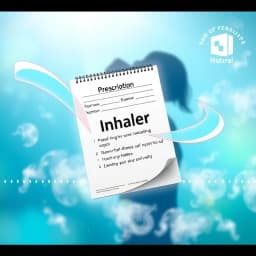
How to Write Inhaler Prescription
Find this useful? Bookmark ( CTRL/CMD + D ) for quick access!
Try an example:
Asthma Management Plan
Pediatric Inhaler Guidelines
Chronic Obstructive Pulmonary Disease
Emergency Inhaler Instructions
Medication Dosage Recommendations
Patient Education Materials
Explore Similar Tools
Recent Generations
Taco Bar Party Ideas
the amount paid directly to you. Yes it is possible in future cases to request direct payment to the provider, Rephrase and give me polished email.
Claim Email Template
we have processed the claim as per the attachments in the claim submission we have processedthe invoice for Saul Holding. We dont have invoice for the Salofalk.
Claim Email Template
this additional information is very important. this adiitional information was requested by our clinical team. Without clinical review claim not be paid so please share the below additional information
How To Write Inhaler Prescription is a powerful AI-powered tool that helps users create accurate and compliant inhaler prescriptions effortlessly. This innovative solution combines advanced natural language processing with a user-friendly interface to deliver precise, tailored prescriptions for patients with respiratory conditions.
Key Capabilities
- Automated Prescription Generation with customizable templates to ensure compliance with medical regulations and best practices.
- Real-Time Drug Interaction Checks enabling healthcare providers to avoid potential medication conflicts and enhance patient safety.
- Patient-Specific Recommendations for inhaler types and dosages based on individual health profiles and conditions.
- Seamless Integration with electronic health record (EHR) systems to streamline workflows and improve efficiency in clinical settings.
Who It's For
Designed for healthcare professionals, including doctors, pharmacists, and nurse practitioners, How To Write Inhaler Prescription excels in creating precise inhaler prescriptions. Whether you're managing a busy clinic or providing telehealth services, this tool streamlines your workflow and enhances productivity.
Why Choose How To Write Inhaler Prescription
What sets How To Write Inhaler Prescription apart is its intelligent prescription algorithms and comprehensive drug databases, making it the ideal solution for ensuring patient safety and compliance in inhaler therapy.
Ready to transform your prescription writing process? Start using How To Write Inhaler Prescription today and experience the difference in efficiency and accuracy.
Enhance Your Work with How to Write Inhaler Prescription
Leverage the power of AI to streamline your tasks with our How to Write Inhaler Prescription tool.
Guided Prescription Templates
Access customizable templates that guide you through the process of writing inhaler prescriptions accurately.
Error Detection
The AI tool identifies potential errors in your prescriptions, ensuring compliance with medical standards.
Educational Resources
Gain access to a library of resources that educate users on inhaler types, dosages, and best practices for prescribing.
How How to Write Inhaler Prescription Works
Discover the simple process of using How to Write Inhaler Prescription to improve your workflow:
Input Patient Information
Enter the necessary details about the patient, including age, weight, and medical history.
Select Inhaler Type
Choose the appropriate inhaler type based on the patient's condition and treatment plan.
Customize Prescription
Adjust dosage and frequency according to the latest clinical guidelines and patient needs.
Generate Prescription
Review the prescription details and generate a formatted document ready for printing or sharing.
Use Cases of
How to Write Inhaler Prescription
Explore the various applications of How to Write Inhaler Prescription in different scenarios:
Patient Education
Provide clear instructions and guidelines for patients on how to properly use their inhalers, ensuring they understand the importance of adherence to their prescription.
Prescription Accuracy
Assist healthcare providers in generating accurate inhaler prescriptions, reducing the risk of errors and ensuring patients receive the correct medication and dosage.
Medication Management
Help pharmacists and healthcare professionals manage and track inhaler prescriptions, including refills and expiration dates, to improve patient outcomes.
Compliance Monitoring
Enable healthcare providers to monitor patient compliance with inhaler usage through automated reminders and follow-up prescriptions, enhancing treatment effectiveness.
Who Benefits from How to Write Inhaler Prescription?
AI-Powered Efficiency
From individuals to large organizations, see who can leverage How to Write Inhaler Prescription for improved productivity:
Healthcare Professionals
Streamline the process of writing inhaler prescriptions to improve patient care.
Pharmacists
Ensure accurate dispensing of inhalers by understanding prescription details better.
Medical Students
Learn the correct format and requirements for writing inhaler prescriptions.
Patients
Gain clarity on what to expect from their inhaler prescriptions and usage.
Frequently Asked Questions
What types of inhalers can the AI tool help prescribe?
The AI tool can assist in prescribing various types of inhalers, including metered-dose inhalers (MDIs), dry powder inhalers (DPIs), and nebulizers, tailored to the patient's specific needs.
Is the AI tool compliant with medical regulations?
Yes, the AI tool is designed to comply with relevant medical regulations and guidelines, ensuring that it meets the standards set by health authorities for prescription practices.
How does the AI determine the appropriate inhaler for a patient?
The AI analyzes patient data, including medical history, symptoms, and preferences, to recommend the most suitable inhaler, taking into account factors such as ease of use and effectiveness.
Can healthcare providers customize the prescriptions generated by the AI?
Absolutely! Healthcare providers can review and modify the AI-generated prescriptions to better fit their clinical judgment and the individual needs of their patients.
Is training required to use the AI tool effectively?
While the AI tool is user-friendly and intuitive, we recommend a brief training session to familiarize users with its features and functionalities for optimal use in clinical settings.
































